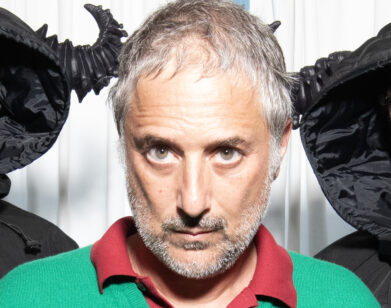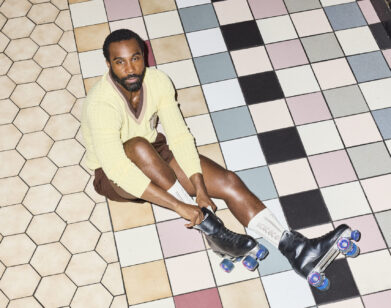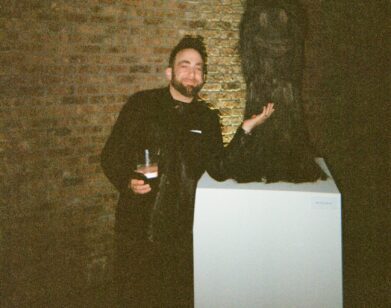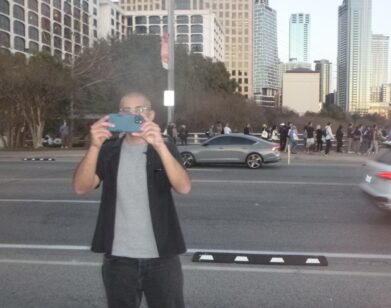Alison Klaymanâ??s Chinese Odyssey
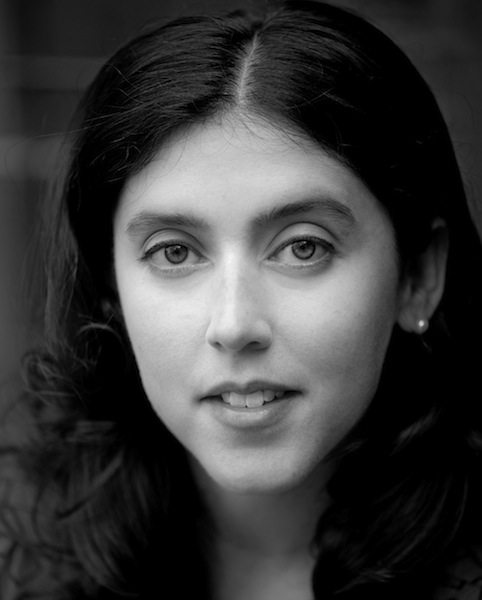
ABOVE: ALISON KLAYMAN. PHOTO COURTESY OF IFC FILMS.
In 2006, Alison Klayman traveled to China without plans, pretension, or a working knowledge of the language. Working as a journalist and documentary filmmaker, Klayman gained unprecedented access to Ai Weiwei, China’s most celebrated—and provocative—contemporary artist.
Her first feature documentary, Ai Weiwei: Never Sorry, compiled from footage shot between 2008 and 2010, captures Ai at a critical juncture in his artistic, political, and personal life. Fresh from attracting international attention for designing the iconic Bird’s Nest stadium of the 2008 Beijing Olympics and denouncing the games as Communist Party propaganda, Klayman follows Ai’s daily life as he synthesizes art and activism to push for transparency and freedom of expression under the Chinese regime, and as he prepares for two of the largest exhibitions of his career, 2009’s “So Sorry” retrospective at the Haus der Kunst in Munich and 2010’s “Sunflower Seeds,” at the Tate Modern in London.
After Chinese authorities shut down his blog in 2009, Ai turned to Twitter, and has amassed an international network of supporters, democratizing activism on a global scale.
As a part of China’s escalating crackdown on outspoken artists and intellectuals, Ai was detained in April 2011, and kept in secret police custody for three months. Released from house arrest this past June, he continues to live under restricted conditions in Beijing.
Awarded the Special Jury Prize for Spirit of Defiance at Sundance, Ai Weiwei: Never Sorry is a revelation of the power of dissent in the digital age, and a stunning, detailed portrait of one of the most multifaceted and charismatic artists in the world today.
We had the opportunity to sit down with Klayman last week to discuss the artist’s embrace of technology, art versus activism, and what’s next for Ai Weiwei.
COLLEEN KELSEY: How did you first meet Ai Weiwei? Were you familiar with his work beforehand?
ALISON KLAYMAN: I hadn’t heard about him before I came to China. Two years into my time in China, in 2008—which was really good because by then I had pretty good working Mandarin, and I had held all different jobs—my roommate at the time, Stephanie Tung, was working at a local gallery and curating an exhibition of Ai Weiwei’s photographs. So the first way that I got to know about him was through these images. They were actually the photos from the decade that he lived in New York in the 1980s. He took about 10,000 photos during that period of time; they were amazing images, as you can kind of get a taste in the movie. They’re super romantic, they’re gritty. . . so cool. She would bring them home to work on and she had these three big black binders filled with contact sheets that were sitting around the house.
At the end of 2008, she asked if I wanted to make a video for the gallery because she just thought there were so many good stories about this body of work that weren’t going to be covered just by showing people the photos. I was really very uninitiated. It was more like, “You’re enthusiastic and have some time! Do you want to do this?” So the first time I met Ai Weiwei was camera-in-hand. The whole context of why I heard about him, how I got to meet him, and how I made a film, it’s kind of all the same one story. I was really, really lucky in that sense.
KELSEY: In the film we see all of these intimate areas of his life, be it public, personal, or artistic. How open was he at first in giving you full access?
KLAYMAN: He was very, very open in terms of speaking. It struck me even in the first few weeks, just how bold he was in terms of speaking critically about the government, and knowing that he was doing that on his blog and that he was doing it in front of my camera, and any journalist’s camera who came by. It still shocks me to this day, to be honest, seeing things he says so bluntly, and takes so much ownership of, but he’s also someone who lives so much online and does share a lot of things publically, transparently, on the internet. We did hit it off well in the beginning because I really didn’t know that much about him, and I didn’t have a particular aim in what I was trying to do. I wasn’t trying to fit him into a certain story. If you’re coming very openly and with a lot of curiosity, if you don’t have a big agenda, I think that he can respond really well to that. As time went on though, and this became a bigger project, the shine was off, I wasn’t as novel as a person, he was really amazing about letting me be around, but at the same time, I did have to push to get some of the more personal moments.
KELSEY: For Weiwei, it seems as if the personal really is political—everything in his life is raw material for artwork and for commentary. When you started filming, did you consider Weiwei to be an artist who is also an activist, or an activist that uses art as an agent for disseminating ideas about social change?
KLAYMAN: That was really one of the initial driving questions. It was an important question and one that was on everybody’s minds and certainly everyone’s lips the first time you interviewed him. I really think that for him it’s coming from the same driving motivation. I never felt like he was like, “Okay, I’m taking my artist hat off and I’m going to put on my social commentator hat or my political organizer hat.” He is a social commentator; he is a political organizer, but I really think that he’s coming from the outlook and motivation of an artist in everything he does. It’s all about communication, that’s what I think his art is about, that’s what his strength is. He’s not so cheeky that he would say, “I just did an interview and that’s my artwork,” but it’s more, I think, of an idea, the idea that everything is part of his art practice.
KELSEY: There’s a moment in the beginning of the film where he likens his artistic practice to a chess game, always waiting for his opponent’s next move to decide what he’s going to do next. Do you consider him to be a reactionary?
KLAYMAN: I think reactionary has a lot of other connotations, so I don’t always think that’s the best word, but I do think that he does not exist, he and his art and his life do not exist, outside of his context. He is very rooted in his context and as such, he is in this game with the Chinese authorities; he is very much entangled with them for the way his life operates. And I think whenever you are doing something that’s kind of off-script in a place that has very little freedom of expression, you’re immediately in that sort of relationship.
What’s going to happen is going to be created by the actions of him and the authorities. What options are going to be presented to him, and how is he going to choose to react to them? I think it’s more a comment on the state of that society in that situation more than saying that he only exists because he’s waiting around to react to something. But absolutely, he’s in that back and forth, in that chess game. I think the story of what’s happened to him the past few years, and this I have talked to him about, it all got here because he did one thing and they did one thing and then suddenly we end up where we are now. He has not gotten here solely by his own force and also where he is now is not solely because of what the government did to him. They are both strong actors in this path.
KELSEY: I read that prior to 2005, Weiwei had never used a computer. Technology and the internet and social media are so vital to how he operates; how did he first embrace them?
KLAYMAN: In 2005, he was invited by Sina.com, which is one of the main web providers and blogging sites, to have, essentially, a celebrity blog. He was a very well known architect and artist and designer, probably still more so abroad, but well known enough. Also, he’s the son of Ai Qing, who everyone has heard of pretty much in China. In his own words, he says, “I figured it was a little bit about the technology,” and also, “My father was a writer, so maybe it would be nice to try my hand and see what I would come up with if I was writing essays.” That’s why he did it, and then he started putting up photos as well. Now, once we see those New York photographs, we see how obsessively he was taking photographs back then, I feel like you can see the strand in all of this. What really excited him about the blog was the two-way street. He’s always been interested in communication and dialogue, so you can imagine how excited he was. It definitely became an obsession.
KELSEY: He obviously acknowledges there’s a level of risk in everything that he does. But when you were filming, did you anticipate that he would actually be arrested?
KLAYMAN: No. I think it’s the kind of thing where you knew the risk was always there. Ultimately all the power is in their hands and they can do anything, but I feel like that just wasn’t the way of life. Being around him and also I guess from my perspective too, if it didn’t happen yesterday, and it didn’t happen today, you didn’t live your life expecting that tomorrow something like that would happen. So to be honest, it was really shocking. The run-up to his detention, those couple of weeks, things were getting much worse. In those couple weeks a lot of people were being detained. It really was in large part a reaction to the Arab Spring and the idea that there might be this jasmine revolution. It had always felt like this kind of thing didn’t reach Ai Weiwei necessarily. I knew it was possible, but I was really surprised.
KELSEY: Abroad, Weiwei receives so much attention. Does the average Chinese citizen know much about him?
KLAYMAN: The answer is no. Very interestingly, if you did this sort of man on the street test, it wouldn’t give you much recognition for Ai Weiwei. I still think though that the whole function of how many people know who Ai Weiwei is, it really still has to do a lot with the way they’ve blocked him off in the domestic audience, which also includes not letting magazines or newspapers that are for the regular people cover him in any way. It’s a pretty effective way of keeping someone from being a mainstream figure or a mainstream celebrity, to just never cover him at all. I think that fact shouldn’t be conflated with his relevance, because I think you see in the film what he is talking about speaks to many, many average people. It does speak to intellectuals and lawyers and artists, but it’s not limited to that at all. I think a lot of what he’s been doing the past few years is trying to get that message out, to find new ways that aren’t just about him, to activate it to keep going down the chain. It’s really about trying to further that. But it is tough when you are becoming persona non grata and a lot of people are not worried about going over the firewall. A lot of people read their daily newspaper and they go on Sina and if that defines your world, how would you know about something else?
AI WEIWEI: NEVER SORRY IS OUT IN LIMITED RELEASE TOMORROW, JULY 27TH.


